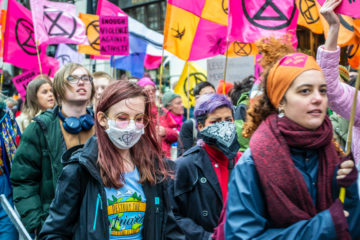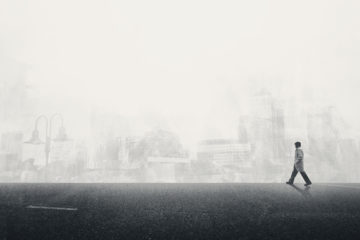
Lockdown and the Climate Crisis
In 2020, lockdowns around the world have reduced energy use and carbon emissions on an unprecedented scale. However, the current COVID-19 outbreak may be a double-edged sword in the fight against climate change. Individual countries are imminently due to report their carbon reductions, as outlined in the United Nations-brokered Paris Agreement. Although pre-Coronavirus crisis global greenhouse gas (GHG) emissions are expected have grown by 1.9%, recent CO₂ calculations in Europe are predicting a surprising scenario: countries may actually hit their stated reduction goals. For instance, the German climate target for 2020, which until February was considered unattainable, should now be met. Due to this year’s mild winter, and, above all, the Coronavirus crisis, the target of 40% CO₂ savings—unlike climate change targets …
The Crisis of Migrant Labour in India during Covid-19
The Indian Government’s initial response to Covid-19—a stringent nationwide lockdown which commenced with an intimation period of only “four hours”—was hailed by the World Health Organisation as “timely and tough.” However, this international acclaim overlooked the disastrous result of the rushed lockdown on India’s migrant workforce. For them, the restrictions imposed by the lockdown has endangered their access to healthcare, housing, food and social security, which has further pushed their lives in precarity. Immediate action is needed from the Central Government to tend to their current needs and provide them with long-term economic stability. Statistics of Migrant Labour in India As per the census of 2011, India has approximately 453.6 million internal migrants. From this, the migrant workforce is estimated to be around 100 million. The Economic Survey of 2017 estimated …
The Health-Security Nexus: Reassessing Priorities after Covid-19
While Covid-19 has spurred debate about the need to elevate public health as a security concern, the securitisation of health presents both opportunities and trade-offs that need to be considered if we are to reallocate military spending to prepare for the next pandemic. The devastating toll of the Coronavirus pandemic has ignited a debate about the intersection of public health and national security. Once recognised as global leaders in pandemic preparedness, the United States and the United Kingdom have struggled to integrate policy responses to Covid-19 into existing security frameworks and to allocate resources accordingly. Indeed, public health spending in both countries pales in comparison to spending on counter-terrorism, even though more American lives have been lost to the pandemic than in all US wars since World War II and the number of Covid-19 deaths in the UK far exceed those attributed to terrorism in the last 50 years. Consequently, some academics and policymakers have questioned whether the prevailing notion of national security—a state’s capacity to defend its territory and …
Liberty in the Time of Corona
We are facing, not a simple trade-off between liberty and public health, but a more complex challenge to maintain liberty as non-domination, despite the erosion of liberty as non-interference. The coronavirus pandemic has led to the severe curtailment of civil liberties and the lockdown of billions of people worldwide. Some states’ reaction to the pandemic has been seen as more effective than others. In particular, authoritarian governments, such as China, boast about their efficient management of the crisis and are now providing support and advice to European and other nations. Consequently, many citizens are questioning the purported advantages of democratic governance. As both democratic and authoritarian states have imposed exceptional measures restricting political and civil liberties, there is a nagging …
Britain-China relations: Is Coronavirus a turning point?
The past five years have been deemed a “Golden Era” in Britain-China relations, with the two countries promoting bilateral trade and investments. However, as the Coronavirus pandemic marches on, this relationship seems to be souring. Voices in Britain, especially in Conservative environments, have raised need to rethink or reset the nation’s relationship with China, who is accused of misinforming and mismanaging the pandemic. While Coronavirus is exacerbating tensions, it would though be incorrect to blame it fully for the chill in relations. A distancing from China was already occurring prior to the pandemic. The foundations of the “Golden Era” were established during the Conservatives’ return to government in 2010. Chinese investments in the United Kingdom were seen as a key source …

Towards the Eruvian Age: Public Space in a Pandemic
In 2013, as two Fellows at New York University, we embarked on an “eruv tour” of Manhattan. Created through almost invisible strings attached to poles that envelope part of the city, this imaginary enclosure serves to delineate a religious space in which it is permissible to carry out the Jewish Sabbath. Today, we contemplate this almost invisible boundary running down Sixth Avenue with new appreciation of the insights it may yet bring to our current predicament as a pandemic of unprecedented proportions forces us to reinvent our common space, the boundaries which define it and the ways we can and should interact within it. The eruv was introduced in Roman Palestine around 50AD for a Jewish community where many of …









